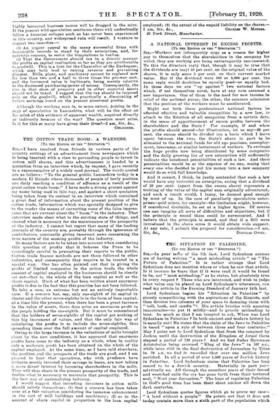LETTERS TO THE EDITOR.
[Letters of the length of one of our leading paragraphs are often more read, and therefore more effective, than those which fill treble the space.]
THE INDUSTRIAL SPECULATION.—TO-DAY'S SOUTH SEA BUBBLE.
(To THE EDITOR OF THE " SPECTATOR."] SIR,-Will you lend your powerful influence to stem the flood of speculation which is now overwhelming several of our great industries, particularly in Lancashire, but, in a lesser degree Perhaps, also in other parts of the country? The causes which have led to this fit of economic madness may be briefly stated as follows :-
(1) Profits on a great scale have been made during the war.• and are likely to continue for a year or two until the world shortage is supplied. (2) Proprietors of businesses who feel that they have made sufficient money, or who are advancing in years, are not unwilling to sell out now that they can obtain extravagant prices.
(3) The continual irritation of labour troubles has led to weariness and a desire to escape from the uncertainties of the future.
(4) Heavy taxation of the profits makes it a great temptation to realize a large increment of capital value which is not subject to taxation. (5) The value of an undertaking and of shares in it is chiefly fixed by its yield in profit, because the "man in the street" usually knows no other criterion of value. The astute financier has realized this fact, and has not scrupled to exploit it.
(6) Extravagant prices can -be and are offered to acquire well-known and high-class undertakings, because the under- takings can be sold again at higher prices to the ignorant investor. Moreover, the profits. will be maintained long enough for the financier to unload.
A day of reckoning will come in a few years, and many
highly honoured business names will be dragged in the mire. If the present wild speculation continues there will undoubtedly follow a financial collapse such as has never been experienced in this country. and widespread ruin will result. I venture to suggest two remedies :— (1) An urgent appeal to the many successful firms with honourable records to stand by their enterprises, and, for patriotic reasons, to resist the temptations to realize.
(2) That the G ti Government should tax in a drastic manner the profits on capital realization so far as they are attributable to goodwill. This is a hint for the Chancellor of the Exchequer, which may both lead to raising revenue and preventing disaster. Mills. plant, and machinery cannot be replaced now for less than two and a half to three times the pre-war cast. and the Increased value is legitimate, being merely relative to the decreased purchasing-power of money. Consequently, the rise in that class of property and in other material assets should not be taxed. I suggest that the tax should be imposed only on the goodwill, which is practically a discounting of future earnings based on the present abnormal profits.
Although the working man is, to some extent, joining in the orgy of speculation in Lancashire. what will be the effect on his mind of this evidence of apparent wealth, acquired directly or indirectly because of the war? The question must arise, Is it for this so many have given their lives?—I am, Sir, &c.,
Osxoozza.



































 Previous page
Previous page